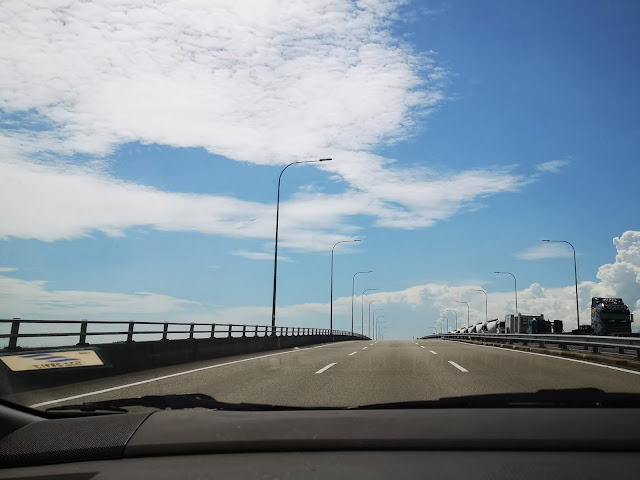The much-anticipated moment was at hand. The focus of our attention was just metres away from us; and it seemed like that moment would never come. But it did. And so last week we took the final step of getting our passports checked; and we crossed the land bridge between Singapore and Malaysia for the first time in more than two years.
 |
| Not a car on the road as we made our first trip to Malaysia in more than two years. |
I remember the last time we crossed that bridge. It was 19 March 2020, just one day after Malaysia effected its Movement Control Order in a bid to curb the spread of the deadly Covid-19 virus. Ours was the only car on the road, and the usually crowded crossing was devoid of all traffic. It seemed as if a deathly stillness had descended on the area; and we didn't know then that it would be the last time we would be travelling, for what has seemed to feel like a lifetime away.
So as we embarked on our travels to Malaysia once again, there was a sense of anticipation and hope. Singapore has eased many of the Covid restrictions that have been in place since the first Circuit Breaker rules were implemented in April 2020. For our family this has been symbolic of the hope that the pains of the last two years might soon come to an end. The freedom to travel has been akin to the removal of a bottle cap, with the pressure within the bottle finally able to find some measure of release. Indeed it has been hard to deal with the pressure of the pandemic, and the ability to travel has brought with it some semblance of normalcy.
 |
| Our boys love to have fun wherever they go. And a vacation is always an important time for the family to unwind after a difficult season. |
This is not the "new normal" terminology that has become prevalent over the past two years. The term has been an attempt to help us come to terms with a world under siege from a global pandemic, an attempt to psychologically cope with the imposed restrictions intended to keep the virus at bay. Yet deep inside, many people still crave the "normalcy" of the past, and while the re-writing of mindsets can help us to manage the grief and loss caused by Covid, there is still an inherent desire to return to pre-Covid days, with all the emotions associated with mental and physical wellbeing.
So for us the trip to Malaysia was simple. We met old friends, ate good food, and went shopping; all aspects of a normal life before the pandemic descended on us. Visiting familiar places brought a certain comfort to us, as we were able to draw from the memories of the past to empower us with positive emotions to provide us solace during this difficult time.
Regular rhythms of life help us to feel at ease. When there is a certain cadence in the way we live our lives, this provides the stability and the security to help us maintain our mental wellbeing. However, when this cadence is disrupted, our emotions go into a tailspin, and our mental wellbeing takes a hit. We therefore attempt to get into a "new normal" in a bid to regain some semblance of stability. And much of change happens in this manner - resulting in a constant re-calibrating of the cadences in our lives.
 |
| We have been masked up for far too long; and we truly need some form of respite to get our mental wellbeing back on track. |
But Covid is not merely an ordinary disruption. The impact of the pandemic has been immense, not only in terms of physical health, but also due to the break in the social and economic fabric of life. These are fundamental needs of any person, and what Covid has done was to cause an unnatural distance in social relationships, as well as to result in an economic hiatus. Both of these effects have significantly affected the mental wellbeing of an entire society. That's not normal. What we need is a return to pre-Covid normalcy, especially if one is to avoid any notion of a dystopian future with pandemic restrictions enforced as a "new normal".
So our journey across the bridge, and the resumption of travel in general, has been symbolic of one small step for humankind, and one giant leap for humanity.
 | |
|

Comments
Post a Comment